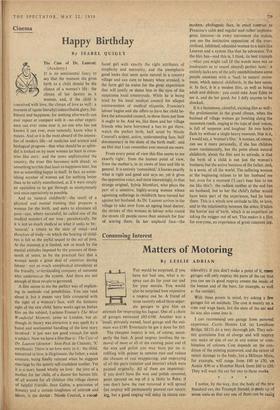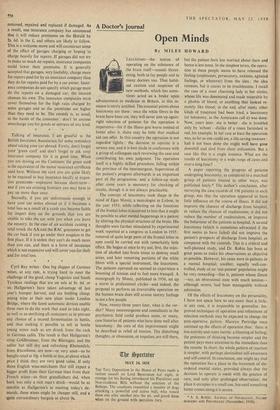Consuming Interest
Matters of Motoring
By LESLIE ADRIAN The cheapest respray is not, of course, neces- sarily the best. A good respray involves the re- moval of most or all of the existing paint and of the wax and polish you may have put on it; refilling with primer to remove rust and reduce the chances of rust reappearing; and respraying of all the parts (exterior and interior) which were painted originally. All of these are important : if you don't have the wax and polish removed, paint sprayed on top of it is likely to flake; if you don't have the rust removed it will spread (no respray will permanently prevent rust return- ing, but a good respray will delay its return con- siderably); if you don't make a point of it, many garages will only respray the parts of the car that you can see (a good respray covers the inside of the bonnet and of the boot, for example, as well a'. the outside).
With these points in mind, try asking a few garages for an estimate. The cost is mainly on a time and wage basis, but the state of the car and its size also come into it.
I can recommend one garage from personal experience. Carris Motors Ltd. (at Lewisham Bridge, 5E13) do a very thorough job. They sub- mit quotations free of charge and will respray any make or size of car in any colour or com- bination of colours. Cost depends on the con- dition of the existing paintwork and the extent of minor damage to the body, but a Hillman Minx, for example, will .range from £40 to £50, an Austin A90 or a Humber Hawk from £60 to £80. They will want the car for two to three weeks, I notice, by the way, that the body of the new Standard car, the Triumph Herald, is made up of seven units so that any one of them can be easilx removed, repaired and replaced if damaged. As .a result, one insurance company has announced that it will reduce premiums on the Herald by 2s. 6d. in the £, and others are likely to follow. This is a welcome move and will counteract some of the effect of garages charging or hoping to charge heavily for repairs. If garages did not try to make so much on repairs, insurance companies could lower their premiums. It is generally accepted that garages, very foolishly, charge more for repairs paid for by an insurance company than they do for repairs paid for by a car owner. Insur- ance companies do not specify which garage must do the repairs on a damaged car; the insured chooses his own. The insurance companies must cover themselves for the high rates charged by some garages and so the premiums are higher than they need to be. The remedy is, as usual, in the hands of the consumer : don't let anyone overcharge you for goods or services of any kind.
*
Talking of insurance, I am grateful to the British Insurance Association for some reminders about taking your car abroad. Firstly, don't forget your 'green card' and don't forget to ask your insurance company for it in good time. When you are driving on the Continent the green card is the equivalent of the motor insurance certificate used here. Without the card you are quite likely to be required to buy insurance locally at expen- sive premiums—expensive because short-term— and if you are crossing frontiers you may have to pay up more than once.
Secondly, if you are unfortunate enough to have your car stolen abroad or if it becomes a total loss as a result of a crash you become liable for import duty on the, grounds that you are unable to take the car with you when you leave the country. In the case of an accident causing a total wreck the AA and the RAC guarantee to get the car back if you go under their auspices in the first place. If it is stolen they can't do much more than you can, and there is a form of insurance which is not expensive and will cover you for theft and for total loss.
* * *
Cyril Ray writes : One big shipper of German wines, at any rate, is trying hard to meet the challenge of the good, cheap Yugoslav and South Tyrolean rieslings that are on sale at 8s. 6d. or so. Hallgarten's have taken advantage of last year's bumper harvest, and are bottling cheap, young wine at their new plant under London Bridge, where the latest automatic devices enable three men to do the work that used to take eight, as well as so sterilising all containers as to prevent any chance of a second fermentation in bottle, and thus making it possible to sell in bottle young wines such as are drunk from the cask in German cafes. The result is that Hallgarten's crisp Goldbrunner, from the Rheingau, and the softer but still dry and refreshing Rheinmilch, from Rheinhesse, are now—or very soon—to be bought retail at lgs. a bottle or less, at about which price I think they are very good value. If only those English wine-merchants that still expect a bigger profit from their German than from their French wines—as their grandfathers did, when hock was only a rich man's drink—would be as sensible as Hallgarten's in meeting today's de- mands, these wines might be cheaper still, and a quite extraordinary bargain at about 9s.







































 Previous page
Previous page